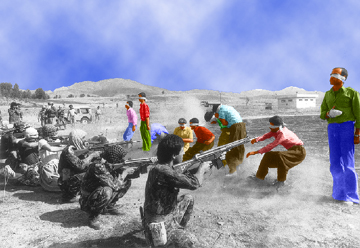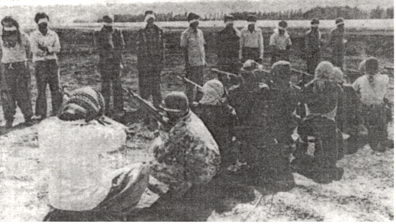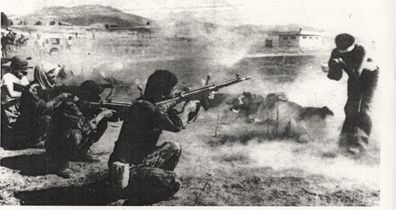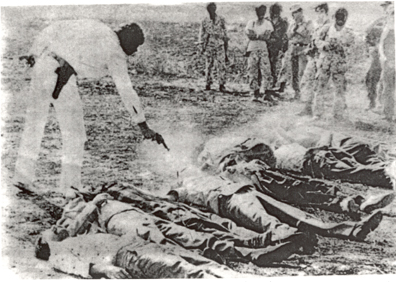|




Ayatollah Khalkhali: If they
were guilty they will go to hell and if they were innocent they will go to
heaven.
In April of
1979, Khomeini denounced the
Democratic Party
of Iranian Kurdistan as an anti-Islamic Party, issued a fatwa, and thus
declared a holy war on the Kurds of Iran.
On August 18, 1979, two
days after Khomeini assumed powers as commander in Chief of the Armed
Forces, he sent the army to attack and occupy Paveh, Sanandaj and Saghez.
Having defeated the Kurds in the cities, Khomeini appointed Khalkhali, as
head of security for Kurdistan, who proceeded with a series of summary
trials and executions. The following is
an example of
such a trial:
Khalkahli:
Where were you born?
Defendant:
I was born in Orumiyeh.
Khalkhali:
What happened to your hand?
Defendant:
During the Tehran uprisings [the Islamic Revolution] a grenade exploded in
my hand.
Khalkhali:
Very good! Very good! What are you doing here?
Defendant:
I came here as a guest, to take part in a social get-togethering.
Khalkhali:
That is good! Born in Orumiyeh, took part in the Tehran uprising, executed
in Saghez. It all goes very well together. Kill him! Next!
Khalkhali’s Assistant:
This fellow’s father is a usurer.
Defendant:
My father is a usurer. What does that have to do with me?
Khalkhali:
Usury is haram, and so is the seed of usury. Kill him! Next...
On that
same day, at least 24 other young Kurds were tried by Khalkhali, in the
same manner, and executed in the city of Saghez. Similar trials and
executions took place during the days that followed, in other cities. On
another day, for example, in the city of Mahabad, 59 other Kurdish men
were tried and executed by the same revolutionary court. In response to
the question as to whether the people that had been executed were guilty
or not, Khalkhali claimed: “If they were guilty they will go to hell and
if they were innocent they will go to heaven.”
And thus, the Islamic Republic continued to fight and to
prosecute the Kurds of Iran, resulting in the death of over 40,000 Kurds
and the destruction of at least 350 of their villages.
|

